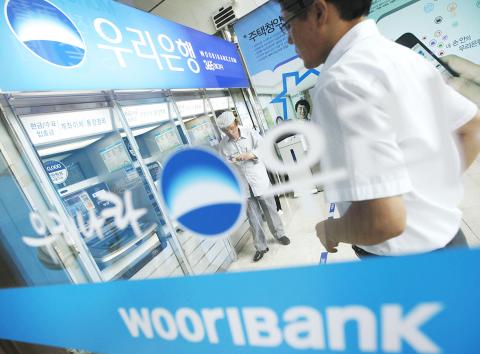South Korea’s anti-trust watchdog yesterday launched a probe into major local banks suspected of colluding to fix interest rates of certificates of deposit (CD), bank officials said.
The probe comes after news in Britain that Barclays and, allegedly, other banks manipulated the London interbank offered rate in an attempt to mask their financial problems, and in some cases to profit.
The Fair Trade Commission sent investigators to the headquarters of Kookmin, Woori, Shinhan and Hana banks, a day after it launched a probe into brokerage firms, bank officials said. Brokerages, which report CD rates twice a day, are suspected of colluding to fix rates on 91-day certificates.

Photo: Reuters
A CD is a way of saving with a specified fixed interest rate and maturity sold by banks and circulated in the secondary market by brokerages. The three-month CD rate is used as a benchmark in setting lending rates for financial products.
CD rates remained relatively higher than other market rates, although the Bank of Korea unexpectedly cut its policy rate to 3 percent last week.
Banks benefit from high CD rates as a bulk of household loans are tied to them.
Financial officials say household debts, which stood at 857 trillion won (US$752 billion) at the end of March, pose a downside risk to the economy amid a global economic slowdown and a sluggish domestic property market.
Many South Korean households rely on debts to buy a house and pay only the interest every month, paying back the principal when they sell the house. However, a weak property market often means they cannot make enough to pay back the principal when the loan is due.
Moody’s Investors Service said last month household loans have grown “at an alarming rate” and are vulnerable to financial shocks arising from the global economic downturn. More people are borrowing just to meet living expenses and there is an increase in borrowers from the older age group and lower income group, it said.

Nvidia Corp chief executive officer Jensen Huang (黃仁勳) on Monday introduced the company’s latest supercomputer platform, featuring six new chips made by Taiwan Semiconductor Manufacturing Co (TSMC, 台積電), saying that it is now “in full production.” “If Vera Rubin is going to be in time for this year, it must be in production by now, and so, today I can tell you that Vera Rubin is in full production,” Huang said during his keynote speech at CES in Las Vegas. The rollout of six concurrent chips for Vera Rubin — the company’s next-generation artificial intelligence (AI) computing platform — marks a strategic

REVENUE PERFORMANCE: Cloud and network products, and electronic components saw strong increases, while smart consumer electronics and computing products fell Hon Hai Precision Industry Co (鴻海精密) yesterday posted 26.51 percent quarterly growth in revenue for last quarter to NT$2.6 trillion (US$82.44 billion), the strongest on record for the period and above expectations, but the company forecast a slight revenue dip this quarter due to seasonal factors. On an annual basis, revenue last quarter grew 22.07 percent, the company said. Analysts on average estimated about NT$2.4 trillion increase. Hon Hai, which assembles servers for Nvidia Corp and iPhones for Apple Inc, is expanding its capacity in the US, adding artificial intelligence (AI) server production in Wisconsin and Texas, where it operates established campuses. This

Garment maker Makalot Industrial Co (聚陽) yesterday reported lower-than-expected fourth-quarter revenue of NT$7.93 billion (US$251.44 million), down 9.48 percent from NT$8.76 billion a year earlier. On a quarterly basis, revenue fell 10.83 percent from NT$8.89 billion, company data showed. The figure was also lower than market expectations of NT$8.05 billion, according to data compiled by Yuanta Securities Investment and Consulting Co (元大投顧), which had projected NT$8.22 billion. Makalot’s revenue this quarter would likely increase by a mid-teens percentage as the industry is entering its high season, Yuanta said. Overall, Makalot’s revenue last year totaled NT$34.43 billion, down 3.08 percent from its record NT$35.52

PRECEDENTED TIMES: In news that surely does not shock, AI and tech exports drove a banner for exports last year as Taiwan’s economic growth experienced a flood tide Taiwan’s exports delivered a blockbuster finish to last year with last month’s shipments rising at the second-highest pace on record as demand for artificial intelligence (AI) hardware and advanced computing remained strong, the Ministry of Finance said yesterday. Exports surged 43.4 percent from a year earlier to US$62.48 billion last month, extending growth to 26 consecutive months. Imports climbed 14.9 percent to US$43.04 billion, the second-highest monthly level historically, resulting in a trade surplus of US$19.43 billion — more than double that of the year before. Department of Statistics Director-General Beatrice Tsai (蔡美娜) described the performance as “surprisingly outstanding,” forecasting export growth